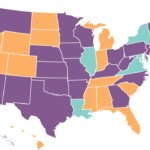Beginning in April 2018, Medicare patients will receive newly designed Medicare identification cards that replace their Social Security numbers (SSNs) with unique, randomly assigned, alphanumeric identification numbers. The Centers for Medicare & Medicaid Services (CMS) is making the change to protect patients 65 and older from exposing their SSNs in efforts to “help prevent fraud, combat identify theft and safeguard taxpayer dollars,” according to CMS Administrator Seema Verma in a Sept. 14, 2017, press release.
The New Medicare Card Project is required as part of the Medicare Access and CHIP Reauthorization Act (MACRA) of 2015. As part of the project, the new Medicare beneficiary identifier (MBI) was created to track billing, eligibility and claim status. The CMS is releasing targeted messaging to Medicare patients, encouraging them to “Guard the Card” so the new, unique identification number is protected and old Medicare cards are safely discarded.
5 Considerations for Providers
Here are five important details regarding the change that rheumatology providers should be aware of to ensure a smooth transition.
- The process for card changes
People with Medicare will receive a new Medicare card in the mail beginning in April 2018. Card mailing will be randomized according to geographic location. The CMS is stressing to Medicare patients that issuance of the new number will not change their benefits. The CMS is also encouraging Medicare patients to make sure their mailing address is current.
- The appearance of the new card
All those with Medicare benefits will receive a new card with their unique MBI number that contains a combination of numbers and uppercase letters. The new number will be 11 characters in length, will use numbers 0–9 and all letters from A to Z—except for S, L, O, I, B, and Z—to support character readability. Also, the new number’s second, fifth, eighth and ninth characters will always be a letter. For example: 1EG4-TE5-MK73. Note that the dashes aren’t used as part of the identification number.
- The transition period
There will also be a 21-month transition period for doctors, healthcare providers and suppliers to use either the current SSN-based Medicare number or the new, unique Medicare number in order to ease the transition. Healthcare providers and people with Medicare will be able to access secure look-up tools that will allow quick access to the new Medicare numbers when needed.
- The details that will remain unchanged
Some CMS documentation will use the health insurance claim number (HICN) until further notice, including quality reporting and disproportionate share hospital data requests. The provider statistical and reimbursement report and accountable care organization reports will also use the HICN until further notice.
- The importance of preparing early
Providers are encouraged to evaluate practice management systems and business processes to determine what changes will need to be made to use the new identification number. Practices that use vendors to bill Medicare should work with these vendors to make sure practice management system changes will accommodate the new identification numbers.



